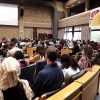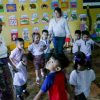News headlines for “Non-governmental Organizations on Development Issues”, page 23
Malawi Moves To Regulate Carbon Trading Amid Transparency Concerns in Global Market
- Inter Press Service

BLANTYRE, Malawi, May 27 (IPS) - Malawi is increasingly pitching carbon trading as a source of revenue it needs to bolster the economy, which is suffering from foreign exchange shortages caused by a large trade imbalance and being buffeted by several shocks, including the climate crisis.
Democracy, Civic Space and Fundamental Freedoms Are under Attack, but Civil Society Is Here to Stay
- Inter Press Service

GABORONE, Botswana, May 23 (IPS) - Sarah Strack is Forus DirectorDuring the Forus network’s General Assembly which took place in Gaborone, Botswana, civil society organisations from across 65 countries highlighted the challenges facing them globally in an increasingly polarised and crisis-hit world.
North Macedonia Turns Back the Clock
- Inter Press Service

LONDON, May 23 (IPS) - The old guard is back in North Macedonia, as the former ruling party – the Internal Macedonian Revolutionary Organization – Democratic Party for Macedonian National Unity (VMRO-DPMNE) – returns to parliamentary and presidential power.
Panama’s Elections: Has Impunity Prevailed?
- Inter Press Service

MONTEVIDEO, Uruguay, May 21 (IPS) - Regional experts called it Panama’s most important election since the 1989 US invasion that deposed de facto president General Manuel Noriega. Panamanians went to the polls amid high inflation and unemployment, with a stagnating economy. Endemic corruption was also high on their long list of concerns, along with access to water, education and a collapsing social security system.
Billions will Vote this Year – LGBTIQ+ People Must not be Excluded
- Inter Press Service

UNITED NATIONS, May 20 (IPS) - This year has been called the ‘super election’ year, with 3.7 billion people potentially going to the polls. This historic political moment is also an opportunity to reflect on what these billions of voter experiences will look like. Who will vote, who can run for office and who might be excluded from the political process?
Women Organize to Fight Coastal Erosion in Southeastern Brazil
- Inter Press Service

ATAFONA, Brazil, May 17 (IPS) - Sonia Ferreira watched as the sea toppled buildings all around her for years. Finally, the impact of the rise in sea levels wrecked her home in 2019. Fishermen find their access to a fishing port limited, affecting their livelihoods. The residents of the coastal town of Atafona in southeastern Brazil count their losses to rising sea levels and climate change.
Solomon Islands: A Change More in Style than Substance
- Inter Press Service

LONDON, May 16 (IPS) - There’s change at the top in Solomon Islands – but civil society will be watching closely to see whether that means a government that’s grown hostile will start doing things differently.
Jeremiah Manele is the new prime minister, emerging from negotiations that followed April’s general election. He’s part of OUR Party, led by outgoing four-time prime minister Manasseh Sogavare. The party came first, winning 15 of 50 constituencies, but several incumbents who stood for it lost their parliamentary seats, and Sogavare only narrowly held his. Weakened, Sogavare stood aside to allow Manele to prevail as the consensus candidate of the post-election coalition his party stitched together.
Inclusivity, Impact, and Innovation Needed to Meet SDGs, UN Civil Society Conference Hears
- Inter Press Service

NAIROBI, May 09 (IPS) - The world is neither on track to meet the Sustainable Development Goals (SDGs) nor is it leveraging emerging opportunities to effectively address global concerns such as extreme hunger, poverty, conflict, and climate change. Global concerns have outpaced existing structures for international cooperation and coping.
Choose Hope: Standing at the Crossroads of the Future
- Inter Press Service

TOKYO, Japan, May 08 (IPS) - We are at the tipping point in human history, facing major existential crises. The conflict between Russia and Ukraine has heightened the risk of a nuclear weapon being used since the Cold War. Furthermore, the climate crisis is accelerating. In these crises, the most affected are those in vulnerable situations.
Working to Keep Náhuat, the Language of the Pipil People, from Vanishing in El Salvador
- Inter Press Service

NAHUIZALCO, El Salvador, May 06 (IPS) - A group of children participating in an immersion program in Náhuat, the language of the Pipil people and the only remaining pre-Hispanic language in El Salvador, are the last hope that the language will not die out.
Web feed for Non-governmental Organizations on Development Issues news headlines
 Global Issues
Global Issues
